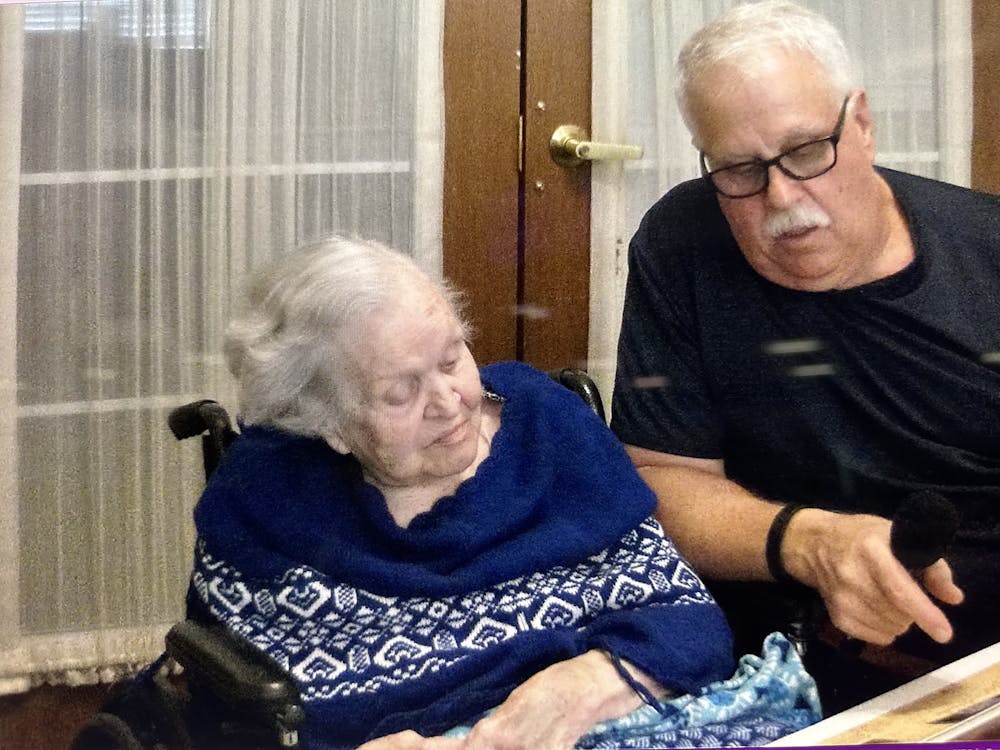Every day, 95-year-old retiree Francine Taylor sits peacefully in her wheelchair, absorbing the cool winds, which delicately touch her face, outside her senior living center in West Gainesville. With her son by her side, they hold each other hand in hand. Racing through her head as she stares mute may be millions of memories from her years in World War II Europe, where she and her family became target to a mass Jewish genocide.
“People need to know it’s still happening,” her son said in reference to the recent attacks on Israel, a predominantly Jewish state, by the Palestinian terrorist organization Hamas. His mother looked down in silence, blank in stare.
The Holocaust was a Nazi-led extermination and incarceration of minority groups across the continent of Europe under Adolf Hitler’s reign in Germany from 1933 to 1945. The tragedy forced countless into concentration camps, ghettos and gas chambers, leading to the death of approximately six million Jewish people, reducing the Jewish population in Europe by two-thirds and the world population of Jewish people by one-third.
“She’s been dreaming a lot about all the family members she has lost,” Forrest Taylor, her son, said.
Taylor, her father, her mother and her sister were residing in France at the time of the Nazi siege of the country. She never fell victim to being incarcerated and sent to a camp; however, there were certainly times she and her family came close.
She eventually moved to the U.S., where she lived in Charleston, South Carolina, dedicating her time to Holocaust education and activism in the local community. In July, she moved to Gainesville to be closer to her son, 66-year-old Forrest Allen Taylor, settling in an assisted living facility.
“There is a big need for me to make her feel safe and protected,” Forrest said. “At this time in her life, she really needs it.”
Francine Taylor was born Frida Ajzensztark in the summer of 1928, in Karczew, Poland. Her parents, Morthé-Mendel and Grina Azjenszark, were tailors who worked out of the tight confines of their Parisian flat to make end’s meet after moving to the city when she was just 2 years old.
Due to living in poverty and, thus, receiving access to only limited amounts and types of food, Taylor grew anemic and was sent to the French countryside while the rest of her family went into hiding, according to an essay written in 2002 by her sister, Suzy Baton. She was away when her father was suddenly captured in 1940 during the German occupation. She never saw him again.
“After seven years, he was declared dead,” Francine Taylor said in her frail, shaky voice.
She knew her mother and elder sister were hiding in Saint Fraimbault through her exchange of letters with them while in the free part of France. In her attempt to return to them, she faced a near-death experience only a miracle could’ve helped her escape.
By 1943, she had made her way to a train station with only her bicycle and her willpower, intending to pedal more than 600 miles to rekindle with her loved ones. At the station, she was denied entry into a buggy due to the weight of her bike. She was able to access another carriage and patiently followed behind the first before she saw it captured by Nazi soldiers, according to a paper provided by Forrest.
“(I rode) for three-quarters of France,” Taylor said about her bicycle ride after deboarding the buggy.
Along her journey, she once again came close to death’s door when she was shot in the face by a Nazi soldier, Forrest said. Collapsed to the ground and covered in blood, she was saved by a farmer who had heard the shot from where he was. Cleaned up and given sustenance, she gallantly hopped back on her feet, resuming her path.
“One fine day, looking through the window,” Baton wrote in her essay, “we saw Francine pedaling and her poney-tail flying in the wind, and all of a sudden, my mother fainted!”
Taylor was hiding out at a farmer’s flat in Saint Fraimbault for about a year, she said, when a Nazi collaborator recognized her and her family as Jewish and reported them to soldiers.
Her uncle, who was also hiding in the flat, begged the antisemitic farmer who they were renting the room from to help them. The farmer hid them in wine barrels for five days while Nazi soldiers arrived to find and capture them.
“I never really had an appreciation for her survival,” Forrest said. “Her survival is the only reason I am here.”
Taylor returned to Paris by the time of the war’s end, eventually meeting future husband and airforce officer, Harry Taylor. The two moved to the U.S., first to Mobile, Alabama, then to Charleston, where she spoke about her experience at high schools, citadels and colleges, including the College of Charleston, he said.
Forrest moved to Gainesville in 1978 and now works as an attendant at a local bicycle shop, a subtle homage to his mother. About a 10-minute drive away from his mother’s center, he makes an effort to visit her at least twice a day.
Although many of Taylor’s memories of the Holocaust still remain intact, Forrest said she has developed a moderate stage of dementia and Alzheimer’s disease.
Contact Jared Teitel at jteitel@alligator.org. Follow him on twitter @jaredteitel.
Jared Teitel is a third-year journalism major, and this is his second semester as an Avenue reporter. In his free time, he enjoys running, shopping, and drinking coffee.






